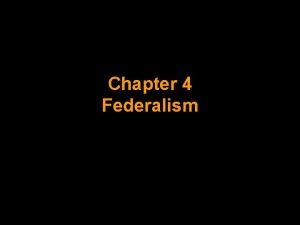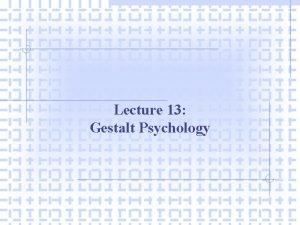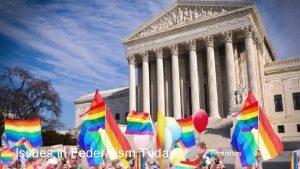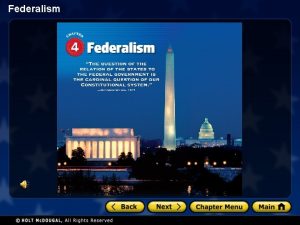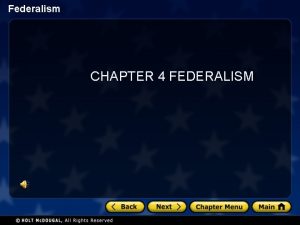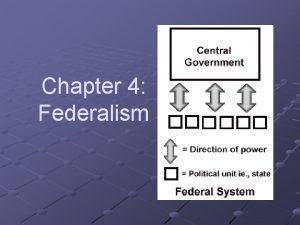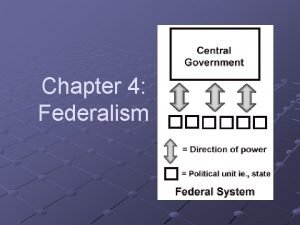Federalism Chapter 4 Section 1 Federalism Founders did










- Slides: 10

Federalism Chapter 4 Section 1

Federalism: �Founders did not explicitly layer state & federal government �Constitution separates state & federal powers but recognizes the existence of “shared powers” �The mere existence of national and state governments does not make for federalism �Key ingredient is power that is divided & shared between the two

Interpretations of Federalism: �Dual Federalism: �Prevalent the first 100 years (or so) after the revolution �Constitution gives limited powers to the national government, leaving most power to the states �Each level of government dominates its own “sphere” �Cooperative Federalism: �Defines federalism as providing goods/services to the people, thus requiring cooperation amongst various levels of government �New Federalism: �Emphasizes shrinking the size & responsibility of the national government & returning more power to the states

Powers of the National Government: �Constitution gives three types of powers to the national government �Delegated Powers: �Or expressed powers, those specifically written in the constitution (collect taxes, coin money, regulate commerce, armed forces, declaring war, granting patents & copywrites)

Powers of the National Government: �Implied Powers: �“Elastic clause” gives congress powers to make all laws which shall be necessary and proper for carrying into execution the foregoing powers �Inherent Powers: �Used in foreign affairs �Don’t depend on specific clauses of the constitution �Powers to acquire territory, recognized foreign states, set immigration policy, protect the U. S. from rebellion

Powers of the States: �Reserved Powers: �Powers held by the states that are not delegated to the national government nor denied to the states �Not specifically listed, but guaranteed by the 10 th Amendment as “reserved to the states respectively, or to the people” �Powers to establish local government, conduct elections, regulating trade within a state and ratifying amendments to the constitution

Other Powers: �Concurrent Powers: �Powers held by both the national and state governments �Not granted exclusively to the federal government nor reserved for the states �Include levying & collecting taxes, separate court systems, making & enforcing laws, borrowing money �Prohibited Powers: �Powers denied to the national government, state government or both �Federal government prohibited from taxing exports & interfering with the states exercise of their rights �State government prohibited from making treaties with foreign governments, coining money or engaging in war

Federal Responsibilities: �Guarantee a republican form of government to every state in the union �Keep order and protect the states from “domestic insurrection” �Shay’s rebellion anyone? �Admission of new states �Establish standards for states to follow (in return for federal monies)

State Responsibilities: �Can be called upon to organize a militia in times of need �Governor of a state can activate the “National Guard” in times of natural disasters or emergencies �Responsible for the elections of all public officials, including national senators, representatives and the president �Also responsible for voter registration & polling locations �Determine congressional districts �Ratify amendments to the constitution

State Responsibilities to Each Other: �Full Faith & Credit Clause: �Each state must give full faith & credit to the public acts, records and civil judicial proceedings of every other state �Extradition prevents criminals for escaping prosecution (all criminal laws are state laws) by crossing state lines �People visiting other states have all the rights of state residents � Exceptions include voting & tuition rates

